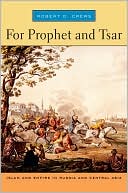

 |

|

The average rating for For Prophet and Tsar: Islam and Empire in Russia and Central Asia based on 2 reviews is 4 stars.
Review # 1 was written on 2008-08-23 00:00:00 Jason Daugherty Jason DaughertyCrews shows how the tsarist government, from the time of Catherine the Great, sought to incorporate Islamic power structures into the ruling apparatus of the state. With Catherine, the idea that Islam should be "tolerated", i.e. no forcible conversions to Russian Orthodoxy, was a result of her Enlightenment era thinking. This toleration was coupled with a desire to use what she saw as the positive aspects of Islam (its respect for authority/the social order/the family, etc.) to bolster the authority of the tsar/tsarina among his/her Muslim subjects, and spread the gospel of enlightened Russian rule to her Muslim neighbors on the empire's southern borders. Hence she created the Muftiate for the Muslims of the Volga. Interestingly, This cooptation of Muslim authority was modeled on the relationship between the tsarist government and the Russian Orthodox Church. However, as Islam does not really possess a centralized hierarchy or leader, like an Orthodox Patriarch or Catholic Pope, this required the construction of an Islamic "church," with a hierarchy of "clergy," a notion that is also problematic in Islam. With some hiccups, this Muftiate worked well in the Volga-Urals region. But, by the time that the Russians began conquering the Kazakh steppe in earnest, as well as Turkestan, there were plenty of official Russian voices that declared that the state should not be subsidizing Islam. As nationalism became a prominent plank in tsarist authority around the mid-19th century (Russian language, culture and religion as the heart of the empire) it became harder for the tsarist government to promote Islam. In the Kazakh steppe, the Russian's played down Islam and enjoyed the Kazakhs to use their own customary law (adat). In Turkestan, the area's first governor-general, Von Kaufmann, tried to ignore Islam, i.e. not make it so central to ruling the region, in hopes that its importance would evaporate. Of course, the whole idea of state controlled Islam was strengthened during Soviet times and survives today in Central Asia. The main point of Crews' book is not that the Russians acted in such a manner, but that the Muslims of their empire constantly involved the state in religious matters. That is, both "clergy" and laymen south to leverage the regional Russian authorities to achieve their own ends. The Clergy called on tsarist police to quash "unofficial" Islamic gatherings (Sufi gatherings), claiming that they were a detriment to the integrity of the Russian state, though they were actually more concerned with such movements diminishing their own power. Laypeople often tried to appeal to the tsarist authorities/Ufa Muftiate over the heads of their local clergy, because they didn't agree with their rulings. The real impact of Crews' work is in showing tsarist Russia's Muslim subjects as shrewd manipulaters of the system, rather than its passive victims. |
Review # 2 was written on 2012-11-04 00:00:00 Niall Fox Niall FoxI've marked this as "read, grad student," which means it was one of dozens of books I consumed in very little time while in graduate school. Generally, I tried to read the introduction and conclusion, the beginning and end of each chapter, and then used the index to find sections of especial interest. Judging by the highlighting in this volume, and my lack of memory of it five years later, I only managed step one (intro and conclusion) with this book. This is unfortunate, because it's a fairly well-written and interesting book, one that I hope I can return to at some point. Essentially, the argument is that, in spite of the predominance of Orthodox Christianity in the Russian Empire, the imperial family learned to cooperate with Muslim subjects and administrated them by means of collaboration with prominent Muslim clerics. As a result, Islam thrived side-by-side with Orthodoxy, and did not become a site of resistance to the regime. Crews's study covers a wide area and several different cultures and languages, but he seems to have managed the challenges well. It is restricted to primarily the nineteenth century, although some discussion of the preceding and following centuries is included as well. One minor criticism I had was that he uses the term "well ordered police state," often in scare-quotes, without explaining its origin. A reader unfamiliar with Russian historiography might think that this was a term contemporary to the subject matter, while as a person who did Russia as a minor field I recognize it as an analytical term introduced by a Russianist, Marc Raeff, but couldn't tell you the full implications of Crews's use of the term. Overall, however, this book is full of fascinating insights and anecdotes, and is probably a worthwhile study for those concerned with the best ways an empire can co-exist with a religion like Islam.] |
CAN'T FIND WHAT YOU'RE LOOKING FOR? CLICK HERE!!!